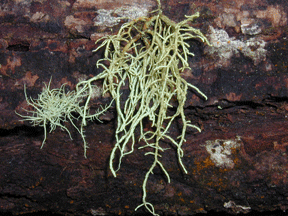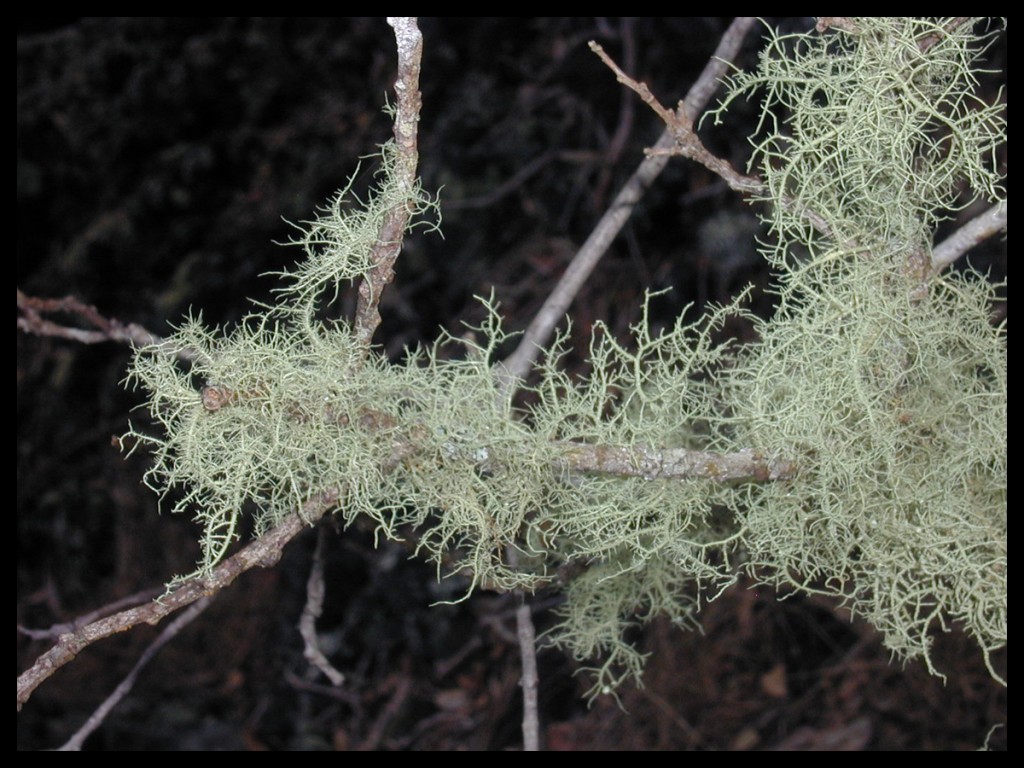Earth Medicine Special Report: Usnea from David Bruce Leonard on Vimeo.
 PLANT NAME: Usnea spp.
PLANT NAME: Usnea spp.
SIMILARLY USED SPECIES: U. barbata, U. ceratina, U. dasypoga, U. florida, U. hirta, U. filipendula, U. longissima
COMMON NAMES: ‘Umi koa (“beard of koa”), limu ‘o ke kuahiwi (“seaweed of the mountain”) [Hawai’i]; song lo [China]; old man’s beard [USA]; chan wiziye (“spirit of the north wind”) [Lakota]; janggut tok adam (“adam’s beard”), rumput angin (“air grass”), tahi angin (“excrement of air”) [Malaysia].
FAMILY: Usneaceae.
CATEGORY: Cool herbs that transform hot phlegm.
PROPERTIES: Bitter sweet neutral.
PART USED: Whole lichen.
PREPARATION OF MEDICINE: Because usnic acid is not water soluble, the tincture is preferred (1:3, 70% alcohol), or you can decoct. A crock pot works well. Usnea can also be made into a salve.
WESTERN FUNCTIONS REPORTED: Antibacterial; antibiotic; antifungal; antiparasitic; antiseptic; as bitters; dermatological aid; eupeptic; general wound healer.
 TRADITIONAL CHINESE ENERGETIC FUNCTIONS (~ = extrapolated):
TRADITIONAL CHINESE ENERGETIC FUNCTIONS (~ = extrapolated):
-
Opens the chest~, cleanses the lungs, transforms phlegm~.
-
Removes damp heat.
-
Invigorates blood~.
-
Clears heat and toxins.
-
Clears deficiency heat~, stops bleeding.
GATHERING:
-
Usnea is not actually a plant but a lichen, which is part algae and part fungus. A good way to identify this lichen is to pull it apart. Medicinal Usnea has a soft thread-like “core” and is always round.
-
Usnea is becoming rare and should only be picked in genuine need. Only take what you will use! Take it from downed branches if possible. Usnea often grows on old-growth trees and it is imperative to not over-harvest. Avoid gathering Usnea from heavily polluted areas, as it might absorb heavy metals from the air. See Other
RESEARCH:
-
Most of the research points to usnic acid being an effective antibacterial against gram-positive bacteria; [Cocchietto 2002; Garcia, 1999], although one study showed it to be also antibacterial against gram-negative bacteria [Rowe 1989]. Its effect on gram-positive bacteria may be due to secondary metabolites of lichens [Lauterwein 1995]. Usnic acid may prevent bio-film colonization by Staphylococcus aureus, Enterococcus faecalis, and Enterococcus faecium on artificial implant devices [Francolini 2004].
-
An usnic acid preparation can inhibit Streptococcus mutans in the oral cavity without altering the normal bacterial equilibrium of the mouth [Ghione 1988].
-
Usnic acid inhibits Epstein-Barr virus activation [Yamamoto 1995] and is a potent inhibitor of mouse polyomavirus because of its ability to inhibit RNA transcription [Campanella 2002].
-
Extracts of Usnea complanta are antiviral in vitro against Herpes simplex virus [Vijayan 2004].Usnic acid is used topically with zinc sulfate to prevent post-surgical recurrence of Human Papilloma virus [Scirpa 1999].
-
Usnic acid is anti-parasitic against Leishmania amazonensis when applied intra-lesionally but not orally or subcutaneously in mice [Fournet 1997]. It has a strong effect against Trichomonas vaginalis in vitro [Wu 1995].
-
Some research points to Usnea spp. extracts being only mildly antineoplastic [Proska 1999], while others report stronger effects [Bezivin 2004; Campanella 2002]. Extracts of U. fasciata containing the polysaccharide raffinose inhibited close to 90% of sarcoma 180 and Ehrlich tumor cells [Periera 1994].
-
Usnic acid is anti-inflammatory in lab animals for both acute and chronic conditions [Vijayakumar 2000]. It is analgesic and reduces induced fever in mice [Okuyama 1995].
TOXICITY: None noted when using the whole lichen.
CAUTIONS AND CONTRAINDICATIONS: Not in pregnancy. May cause contact dermatitis in topical use, discontinue if rash develops [Mitchell 1965; Goncalo 1987]. If used in autoimmune conditions, monitor immune status carefully.
NOTES
-
Used as medicine in Ancient Egypt, Rome, Greece, and China since before the time of Christ. The use of Usnea was documented in “The Formulary of Al-kindi,” A.D. 850
-
In Native American traditions Usnea represents the north and maintains the “lungs” of Planet Earth. In those traditions Usnea has a sacred primeval relationship with the trees, helping to protect them against infections.
-
One of our best plants for chronic respiratory problems. Because it does well as a tincture, it is often taken separately from the rest of an herbal formula.

